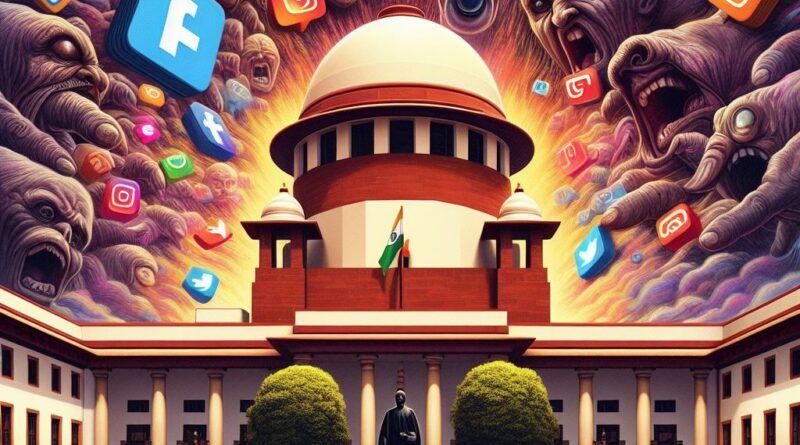Supreme Court of India Raises Concerns Over Misuse of Social Media for Spreading Misinformation | IAS Banenge
Context:
The Supreme Court of India has expressed concerns about the increasing misuse of social media platforms to disseminate misinformation regarding ongoing court cases. The court has highlighted that such “fake news” interferes with judicial proceedings and requires immediate attention and action.
Relevance:
GS II: Polity and Governance
READ MORE- Young Voters Show Reluctance in Participation Ahead of 18th Lok Sabha Elections
Dimensions of the Article:
- How Social Media is Regulated in India?
- Impacts of Social Media on Different Sections of Society
- Enhancing the Utility and Credibility of Social Media
How Social Media is Regulated in India?
Information Technology Act, 2000 (IT Act):
- This foundational law establishes the legal framework for electronic governance and governs various aspects of electronic communication, including social media.
- Section 69A of the IT Act, 2000 grants the Government authority to block public access to information under specific conditions related to:
- Sovereignty and integrity of India
- Defence of India
- Security of the State
- Friendly relations with foreign States
- Public order
- Prevention of incitement to cognizable offenses related to the above.
- Section 79(1) of the IT Act, 2000 provides intermediaries, such as social media platforms, exemption from liability for third-party information, subject to certain conditions:
- The intermediary’s role is limited to providing access to a communication system for transmitting, hosting, or storing third-party information.
- The intermediary does not initiate or control the transmission, recipient selection, or content modification.
- However, certain contentious sections like Section 66A (pertaining to online content) were invalidated by the Supreme Court due to concerns regarding freedom of speech, as seen in the Shreya Singhal v/s Union of India Case.
Information Technology (Intermediary Guidelines and Digital Media Ethics Code) Rules, 2021:
- These rules mandate social media platforms to exercise greater diligence in content moderation to ensure online safety by promptly removing inappropriate content.
- Users must be informed about privacy policies and are advised to avoid posting copyrighted material, defamatory content, or anything threatening national security or friendly relations.
- The 2023 Amendment to these rules requires online intermediaries, including social media platforms like Facebook and internet service providers like Airtel, to prevent the dissemination of inaccurate information about the Indian government.
- They are also mandated to remove content flagged as false by fact-checking units to maintain legal protection from third-party content.
- However, the implementation of amended provisions was recently halted by the Supreme Court.
Impacts of Social Media on Different Sections of Society
Youth and Adolescents:
Positive Impacts:
- Access to diverse information and educational resources.
- Platforms for self-expression, creativity, and building communities.
- Opportunities for networking, collaboration, and skill development.
Negative Impacts:
- Increased exposure to cyberbullying, harassment, and online predators.
- Risk of addiction and negative effects on mental health due to excessive use.
- Pressure to conform to unrealistic standards of beauty and lifestyle portrayed on social media.
Adults:
Positive Impacts:
- Enhanced connectivity with friends, family, and professional networks.
- Platforms for staying informed about current events, trends, and opportunities.
- Opportunities for entrepreneurship, marketing, and career advancement.
Negative Impacts:
- Time-wasting and productivity loss due to excessive scrolling and distraction.
- Privacy concerns and risks of identity theft, fraud, and data breaches.
- Impact on interpersonal relationships and communication skills.
Elderly:
Positive Impacts:
- Access to social networks and communities for staying connected with family and friends.
- Opportunities for lifelong learning, hobbies, and sharing experiences.
- Platforms for advocacy, support, and raising awareness about issues affecting older adults.
Negative Impacts:
- Digital divide and challenges in learning to use new technologies.
- Vulnerability to online scams, misinformation, and exploitation.
- Potential for social isolation if not actively engaged in online communities.
Marginalized Communities:
Positive Impacts:
- Platforms for amplifying voices, sharing experiences, and advocating for social justice.
- Access to support networks, resources, and opportunities for empowerment.
- Ability to challenge stereotypes, combat discrimination, and foster solidarity.
Negative Impacts:
- Increased exposure to online hate speech, discrimination, and harassment.
- Amplification of inequalities due to disparities in access to technology and digital literacy.
- Potential for surveillance, censorship, and suppression of dissenting voices in authoritarian regimes.
Enhancing the Utility and Credibility of Social Media
Algorithm Transparency
- Mandating platforms to disclose and clarify their algorithms’ operations to mitigate biases and enhance content visibility.
Transparency Reports
- Requiring platforms to release regular transparency reports on content moderation, data practices, and adherence to regulatory standards to foster accountability.
Digital Literacy Education
- Implementing comprehensive digital literacy programs to empower users in recognizing and addressing misinformation and online harassment.
Advanced AI Tools
- Developing sophisticated AI solutions for content moderation to promptly identify and eliminate harmful content while safeguarding freedom of expression.
Technological Investments
- Investing in technologies like end-to-end encryption and data anonymization to reinforce user privacy and security.
Ethical Design Practices
- Promoting ethical design principles that prioritize user well-being, mental health, and meaningful engagement rather than solely focusing on user engagement metrics.
Incentivizing Informative Content
- Introducing mechanisms to reward users who create informative, educational, or community-oriented content.
- Highlighting initiatives such as India’s National Creators Award 2024 as significant strides in this endeavor.
-Source: Times of India




